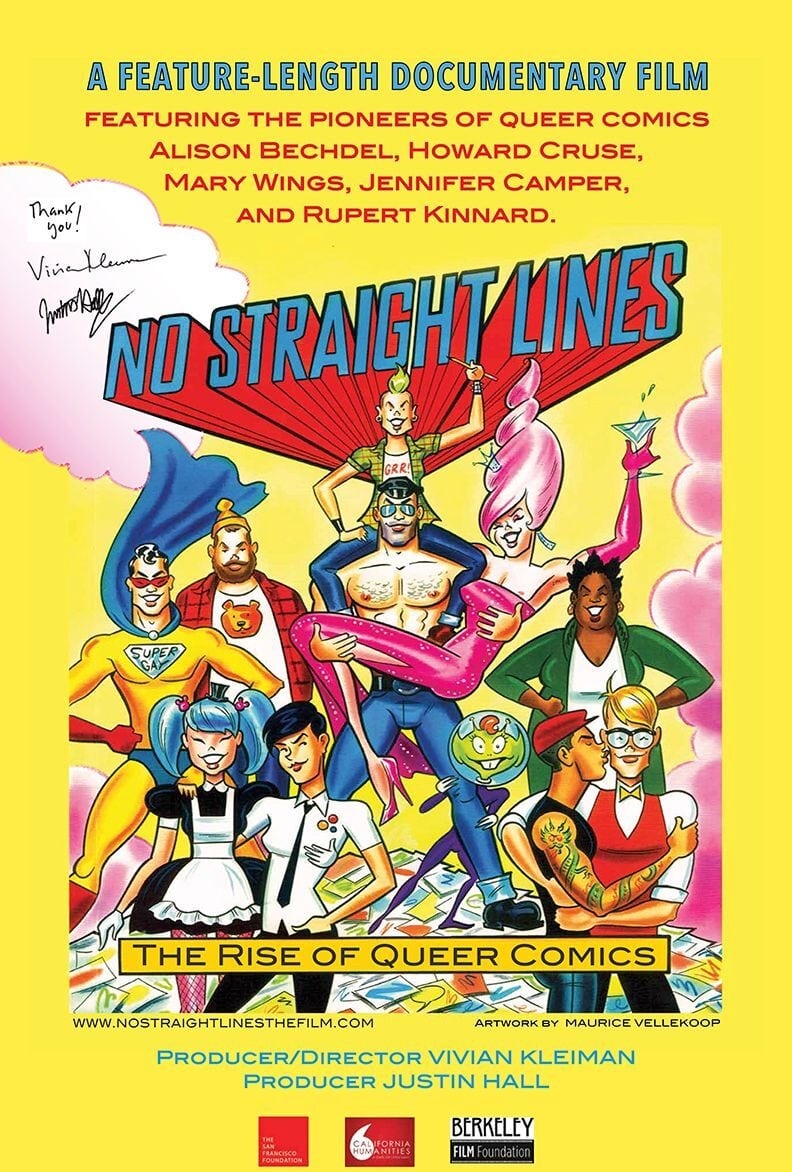
I did it again. Instead of reading a book or graphic novel for “What I’m Reading,” I watched a film. Mea culpa, please send all complaints to the round filing cabinet by my desk. My pick this month is the documentary No Straight Lines: The Rise of Queer Comics (2021).
No Straight Lines was directed by Vivian Kleiman and is an adaptation of Justin Hall’s anthology of the same name published by Fantagraphics in 2012. The documentary premiered in June at the Tribeca Film Festival. Later in the month, the film had its West Coast premiere at the Frameline Film Festival in San Francisco, where I caught it streaming. Frameline’s mission is to “change the world through the power of queer cinema.”
The film is a primer on the history of, and pivotal moments for, queer comics. No Straight Lines charts the development of the movement from its days in the Underground Comix scene to the mainstream award-winning Broadway adaptation of Alison Bechdel’s Fun Home. The documentary is guided through the stories of five comics creators — Alison Bechdel, Jennifer Camper, Howard Cruse, Rupert Kinnard, and Mary Wings.
The Story
Through the lenses of our five artists, we hear and see the journey of queer comics as they adjust to the times and the laws. Forbidden by the Comics Code Authority, the movement rises in the Underground Comix scene. From there, it moves into newspapers, then zines, into graphic novels, and eventually online and the stage. We hear all the personal, painful, and joyous stories from the artists who lived it. It was quite inspiring.
An added bonus to the whole film is hearing the artists talk shop and watching them create. Kinnard making the Brown Bomber appear on the page, Cruse talking about his crosshatching technique, Bechdel discussing the right paper and brushes to use — it was all sublime and never bogged down the main narrative.
Community Throughline
One of my favorite aspects of the film was the throughline connecting generations of LGBTQ+ artists. Each new section of the film opens with a string of younger artists reflecting on the work that inspired them as artists or inspired them to move into the cartooning and comics space. Among these artists (which included Breena Nuñez and Lawrence Lindell from the BAYlies, whom I’ve covered in the past), it was clear how important representation is.
I also enjoyed hearing stories from Howard Cruse, the “Godfather of Queer Comics.” Asked to edit Gay Comics by Denis Kitchen, he put himself out there to connect with other artists and create a space for self-representation. For years he gave fellow artists industry advice. We see his influence on the following generations when Bechdel says she used Cruse’s Stuck Rubber Baby as a guidepost for her own graphic novel Fun Home.
From a CBLDF standpoint, No Straight Lines serves as another reminder of why it’s so important to combat identity censorship. Representation matters. I would put this documentary on a list of must-see films for folks interested in comics history.
What I’m Reading is part of an opinion series written by editor Jordan Smith. The goal of the series is to highlight media related to the comics community that resonates with the mission of the Comic Book Legal Defense Fund.